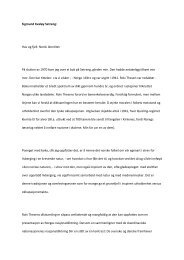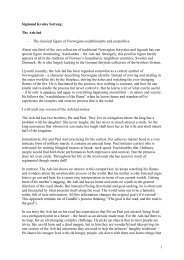The Healing Power of Nature - Norwegian Journal of Friluftsliv
The Healing Power of Nature - Norwegian Journal of Friluftsliv
The Healing Power of Nature - Norwegian Journal of Friluftsliv
Create successful ePaper yourself
Turn your PDF publications into a flip-book with our unique Google optimized e-Paper software.
health <strong>of</strong> the planet earth. It is believed that the mind can be comforted and healed through time in<br />
natural environments. <strong>The</strong>refore the destruction <strong>of</strong> the natural environment negatively affects the<br />
physical and mental health <strong>of</strong> humans. <strong>The</strong> paradigm <strong>of</strong> ecopsychology supports the healing value that<br />
occurs when people are in nature, including the work <strong>of</strong> outdoor pr<strong>of</strong>essionals in environmental<br />
education, organized camping, adventure education, and wilderness and adventure therapy.<br />
Edith Cobb’s (1895 – 1977) work is an example <strong>of</strong> early research supporting ecopsychology and<br />
demonstrating this connection between healthy human development and nature. Cobb trained in social<br />
work in the 1950s with an interest in the natural world, child development, and adult psychology<br />
undertook a massive research project wherein she collected and analyzed more than 250<br />
autobiographies. In <strong>The</strong> Ecology <strong>of</strong> Imagination in Children Cobb (1977) establishes the importance <strong>of</strong><br />
children’s deep experience <strong>of</strong> the natural world to their adult cognition and psychological well-being.<br />
She suggests that a sense <strong>of</strong> place (a tree, a stream, a knoll) is vital to a child's evolving personality<br />
and makes a connection between happy childhood experiences and time in nature and adult creativity<br />
(Cobb, 1977). Chawla (2002) expanded on Cobb’s work and reinforces the importance <strong>of</strong> children<br />
spending time in the natural world in an unthreatening way that encourages a bond based on<br />
connection rather than on fear. An overwhelming majority <strong>of</strong> the environmentalists whom Chawla<br />
interviewed experienced “positive experiences <strong>of</strong> natural environments in childhood and adolescence,<br />
and family role models who demonstrated an attentive respect for the natural world” (Chawla, 2002, p.<br />
212).<br />
By the 1990s, the concept <strong>of</strong> ecopsychology and our need to heal and be healed by the planet had<br />
become more widespread. Today ecopsychology has developed into a discipline with college textbooks,<br />
such as Deborah Du Nann Winter's (1996) Ecological Psychology: <strong>Healing</strong> the Split between Planet and<br />
35




